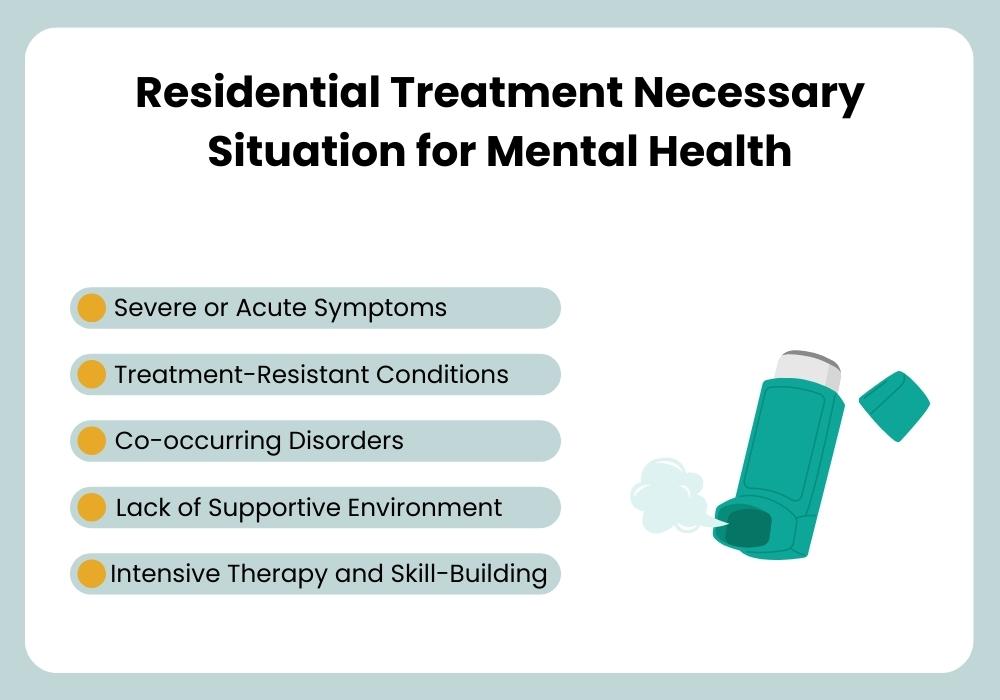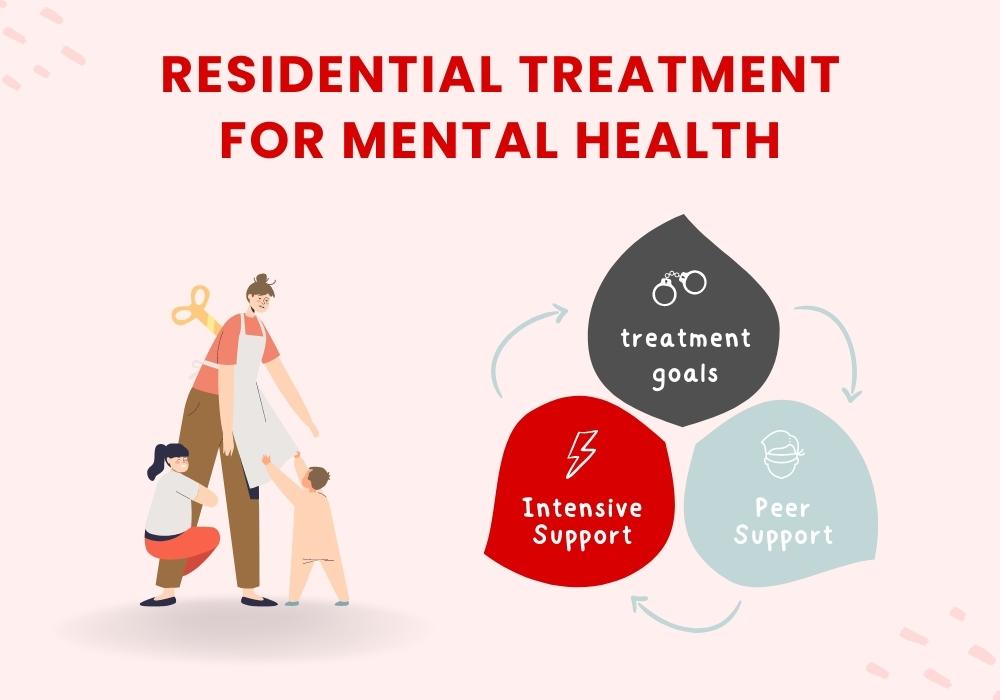Seeking professional help is crucial when it comes to addressing mental health challenges. While outpatient therapy and counseling are often effective treatment options. Some individuals may require a more intensive level of care. How long is the residential treatment for mental health? These programs provide comprehensive support for individuals dealing with severe mental health conditions. Which may require a structured and immersive environment.
In this blog post, we will explore the duration of residential treatment for mental health. Shed light on what individuals can expect during their stay.
What do you understand about residential treatment for mental health?
Residential mental health treatment refers to a type of therapeutic program where individuals with mental health conditions receive comprehensive care in a structured residential setting. It involves temporarily living in a specialized facility that offers round-the-clock support, supervision, and therapeutic interventions for individuals experiencing significant mental health challenges. This form of treatment is designed to provide a higher level of care and support than outpatient services, and it is typically recommended for individuals who require intensive treatment due to the severity of their symptoms or the need for a safe and supportive environment.
Residential mental health treatment programs often include individual therapy, group therapy, medication management, skill-building activities, and various evidence-based interventions to address the specific needs of each resident. The goal is to provide a therapeutic and nurturing environment that facilitates healing, promotes recovery, and equips individuals with the tools and coping strategies necessary to manage their mental health effectively.
Types of residential treatment for mental health
- Inpatient Residential Treatment
- Outpatient Residential Treatment
- Partial Hospitalization Program (PHP)
- Intensive Outpatient Program (IOP)
- Therapeutic Community
- Sober Living Homes
- Group Homes
- Residential Treatment Centers (RTC)
- Wilderness Therapy Programs
- Transitional Living Programs
Which is the best residential treatment for mental health?
There is no single “best” residential treatment for mental health, as the effectiveness of treatment varies depending on the individual’s specific needs and circumstances. Different types of residential treatment programs, such as psychiatric hospitals, therapeutic communities, and residential treatment centers, offer various approaches and specialize in different areas of mental health. The most suitable option depends on factors like the individual’s diagnosis, severity of symptoms, treatment goals, and preferences. It is essential to consult with mental health professionals who can assess the specific needs and recommend the most appropriate residential treatment option for each person.
When is Residential Treatment Necessary for Mental Health?

Here are some common scenarios in which residential treatment may be necessary:
- Severe or Acute Symptoms: When someone experiences severe psychiatric symptoms or a mental health crisis, residential treatment can offer a higher level of support and supervision. This is particularly relevant for individuals at risk of self-harm, suicide, or harm to others.
- Treatment-Resistant Conditions: If an individual’s mental health condition has not responded to previous outpatient treatments or interventions, residential treatment may be recommended. This provides an opportunity for a more comprehensive and intensive approach to address complex or chronic mental health challenges.
- Co-occurring Disorders: For individuals who have a combination of mental health disorders and substance abuse issues, residential treatment can offer integrated care to address both conditions simultaneously. The structured environment and 24/7 support can be crucial in managing dual diagnoses effectively.
- Lack of Supportive Environment: When individuals lack a stable or supportive living environment, residential treatment can provide a safe space where they can focus on their recovery without distractions or detrimental influences. This is particularly important for individuals who lack family support or who are homeless.
- Intensive Therapy and Skill-Building: Residential treatment programs often offer a range of therapeutic interventions, including individual therapy, group therapy, and skill-building workshops. These programs can provide a concentrated period for individuals to learn coping strategies, develop life skills, and make progress in their recovery journey.
Ultimately, the decision to pursue residential treatment is made on an individual basis, taking into account the severity of symptoms, level of functioning, and available resources. It is typically made in consultation with mental health professionals who assess the unique needs and circumstances of the individual.
How long is the residential treatment for mental health?
The duration of residential treatment for mental health can vary widely depending on several factors, including the individual’s specific needs, the severity of their condition, the treatment goals, and the program or facility providing the treatment. In general, residential treatment programs typically range from a few weeks to several months.
Short-term residential programs may last anywhere from two to four weeks. These programs are often focused on crisis stabilization, detoxification, or intensive assessment and evaluation. They provide a structured environment and round-the-clock support to address immediate concerns and stabilize the individual’s mental health.
Medium-term Residential Treatment: Medium-term programs typically span from one to three months. They offer a more comprehensive therapeutic approach to address underlying issues and develop coping strategies. This duration allows individuals to delve deeper into their mental health concerns and acquire the necessary skills to manage them effectively.
Long-term residential treatment programs can extend from a few months to a year or more. These programs are designed for individuals who require more intensive and comprehensive care for severe or chronic mental health conditions. They often involve a combination of therapy, medication management, skill-building, and support in a residential setting.
It’s important to note that the duration of residential treatment is highly individualized. Treatment plans are typically tailored to meet the specific needs of the person seeking treatment, and the length of stay may be adjusted based on progress and ongoing assessment. It’s best to consult with mental health professionals or treatment providers to get a more accurate understanding of the expected duration of residential treatment based on your specific circumstances.
Duration benefits of residential treatment for mental health
| Short-term residential treatment benefits | Medium-term residential treatment benefits | Long-term residential treatment benefits |
| 1. Intensive Support 2. Crisis Management 3. Focus on Recovery 4. Comprehensive Assessment 5. Therapeutic Interventions 6. Peer Support 7. Transition and Aftercare Planning | 1. Intensive therapeutic support 2. Safe and supportive environment 3. Peer support and community 4. Structure and routine 5. Multidisciplinary approach 6. Relapse prevention 7. Transition and aftercare planning | 1. The intensive and structured environment 2. Comprehensive assessment and treatment planning 3. 24/7 support and care 4. Structured therapeutic interventions 5. Peer support and community 6. Skill-building and relapse prevention 7. Continuity of care and aftercare planning |
How do I know residential mental health Treatment Rights for me?
- Research: Educate yourself about mental health treatment rights specific to your country or region. Laws and regulations may vary, so focus on resources relevant to your jurisdiction.
- Seek legal advice: Consult with a mental health attorney or legal professional who specializes in mental health law. They can provide guidance on your rights and any legal protections available to you.
- Review documentation: Carefully read any agreements, contracts, or policies provided by the residential mental health treatment facility. Pay close attention to sections outlining patient rights, confidentiality, treatment plans, and complaint procedures.
- Ask questions: Don’t hesitate to ask the treatment facility staff about your rights. Inquire about their policies regarding consent, privacy, visitation, and discharge planning. Seek clarification if anything is unclear or if you have concerns.
- Advocate for yourself: Be proactive in asserting your rights during your treatment. If you feel your rights are being violated or if you have concerns about your treatment, voice them to the appropriate staff members or authorities. It’s essential to speak up for your well-being.
Remember, the specific rights afforded to individuals in residential mental health treatment may differ based on your location and circumstances. Consulting with legal professionals and healthcare providers can help ensure you have accurate and up-to-date information regarding your rights.
Where can I take residential treatment for mental health?
- Residential Treatment Centers (RTCs): These facilities provide comprehensive mental health treatment programs in a structured residential setting. They offer therapy, counseling, medical supervision, and activities to support individuals with mental health challenges.
- Psychiatric Hospitals: Some psychiatric hospitals offer residential programs designed for individuals requiring intensive mental health care. These programs are typically short-term and focus on stabilization and crisis management.
- Therapeutic Communities: Therapeutic communities provide long-term residential treatment in a supportive and structured environment. They emphasize community living and often include vocational training, life skills development, and peer support.
- Dual Diagnosis Treatment Centers: These facilities specialize in treating individuals with co-occurring mental health disorders and substance abuse issues. They provide integrated treatment to address both conditions simultaneously.
- Eating Disorder Treatment Centers: Residential facilities focused on treating eating disorders offer specialized care for individuals struggling with conditions like anorexia nervosa, bulimia nervosa, or binge eating disorder.
- Wilderness Therapy Programs: These programs combine outdoor experiences with therapeutic interventions to promote personal growth and healing. Participants engage in activities like hiking, camping, and group therapy while living in a wilderness setting.
When researching residential treatment options, consider factors such as the facility’s reputation, accreditation, treatment approaches, staff qualifications, insurance coverage, and cost. It’s essential to consult with mental health professionals or contact the facilities directly to obtain detailed information and determine the best fit for your specific needs.
Alternative Options for Residential Treatment for mental health

- Outpatient Treatment Programs
- Intensive Outpatient Programs (IOP)
- Partial Hospitalization Programs (PHP)
- Day Treatment Programs
- Therapeutic Community Programs
- Sober Living Homes
- Supportive Housing
- Wilderness Therapy Programs
- Equine-Assisted Therapy Programs
- Art Therapy Programs
- Yoga and Meditation Retreats
- Mindfulness-Based Stress Reduction (MBSR) Programs
- Adventure Therapy Programs
- Cognitive-Behavioral Therapy (CBT) Programs
- Dialectical Behavior Therapy (DBT) Programs
- Psychiatric Rehabilitation Programs
- Peer Support Programs
- Online Therapy Programs
- Virtual Reality Therapy Programs
- Mobile Crisis Teams
Conclusion
Residential treatment for mental health is a valuable option for individuals requiring intensive and immersive support. While the duration of treatment varies, ranging from short-term to long-term programs, the primary objective is to address the underlying issues, develop coping strategies, and equip individuals with the skills necessary to manage their mental health effectively. By providing a safe and therapeutic environment, residential treatment aims to foster healing and provide individuals with a solid foundation for their journey toward recovery.
Remember, seeking professional advice from mental health experts is crucial when determining the appropriate level and duration of care. Each individual’s needs are unique, and treatment plans should be tailored accordingly to promote optimal well-being and long-term recovery.







1 thought on “How long is the residential treatment for mental health?”